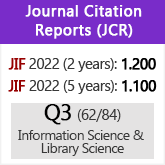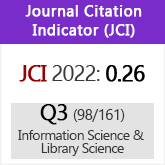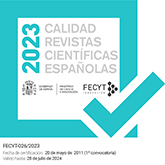The Motivational Knowledge Management Model: proposal to apply it in the library sector
DOI:
https://doi.org/10.3989/redc.2016.4.1302Keywords:
Professional productivity, knowledge management, knowledge management model, evaluation instrument, motivation, ICTAbstract
In professional environments, attention paid to aspects such as supervisory styles, interpersonal relationships and workers eagerness can have a positive impact on employee motivation and, consequently, on their performance and well-being. To achieve this, knowledge management models such as those presented here can be applied. This model generates diagnoses of motivation and recommendations for improvement, both systematically and scientifically. Consequently, it is especially useful for managers and human resource departments. The proposed model can be adapted to different kinds of professional groups, including those in library and documentation services. The suitability, reliability and usefulness of the proposed model have been empirically checked through case studies with 92 students and 166 professionals. The positive results allow us to conclude that the model is effective and useful for assessing and improving motivation.
Downloads
References
Adams, J. S. (1965). Inequity in social exchange. Advances in experimental social psychology, 2, 267-299. https://doi.org/10.1016/S0065-2601(08)60108-2
Cruzes, D.S.; Dyba, T.; (2011) "Recommended Steps for Thematic Synthesis in Software Engineering," International Symposium on Empirical Software Engineering and Measurement (ESEM´11), pp.275- 284. https://doi.org/10.1109/esem.2011.36
Fernández, J. (1987). Escala de motivaciones psicosociales. Madrid: TEA.
Forrester, E.; Buteau, B.; Shrum, S. (2009). CMMI for Services: Guidelines for Superior Service. Massachusetts: Addison-Wesley Professional.
Herzberg, F. (1987). One more time: How do you motivate employees. Harvard Business Review, 65 (5), 109-120.
Kaiser, H.F. (1974). An index of factorial simplicity. Psychometrika, 39, 31-36. https://doi.org/10.1007/BF02291575
Kreitner, R. y Kinicki, A. (1997). Comportamiento de Las Organizaciones. USA: McGraw-Hill.
Ledesma, R., Molina, G. y Valero, P. (2002). Análisis de consistencia interna mediante Alfa de Cronbach: un programa basado en gráficos dinámicos. Psico- USF 7, 143-152.
Levy-Leboyer, C. (2007a). La motivación en la empresa. Barcelona, Ediciones Gestión 2000.
Levy-Leboyer, C. (2007b). Feedback de 360º. Barcelona, Ediciones Gestión 2000.
Linares Pons, N.; Pi-ero Pérez, Y.; Rodríguez Stiven, E.; Pérez Quintero, L. (2014). Dise-o de un modelo de Gestión del Conocimiento para mejorar el desarrollo de equipos de proyectos informáticos. Revista Española de Documentación Científica, 37(2):e044. https://doi.org/10.3989/redc.2014.2.1036
Locke, E., Gary P. (1990). Work Motivation and Satisfaction: Light at the End of the Tunnel. Psychological Science, 1, 240-246. https://doi.org/10.1111/j.1467-9280.1990.tb00207.x
López-Fernández, D.; Alarcón, P.; Casado, M. y Rodríguez, M. (2014). Motivación en estudiantes de ingeniería: Un caso de estudio con teorías e instrumentos para su medida y desarrollo. REDU - Revista de Docencia Universitaria, volumen 12(4), 343-376.
López-Fernández, D. (2015). Estudios y herramientas para la evaluación y la mejora de la motivación en la ingeniería del software. Tesis Doctoral, E.T.S. de Ingenieros Informáticos (UPM).
McClelland, D. (2010). The Achieving Society. New York: Editorial MacMillan.
McGregor, D. (2006). The Human Side of Enterprise. New York: Editorial Mc Graw-Hill.
Ouchi, W. (1981): Theory Z: How American Business Can Meet the Japanese Challenge. USA: Addison- Wesley.
Pereda, P., Berrocal, F. y Alonso, M; (2008): Psicología del trabajo. Madrid: Síntesis.
Pérez, D.; Dressler, M. (2007). Tecnologías de la información para la gestión del conocimiento. Intangible Capital - Nº 15 - Vol. 3- pp. 31-59.
Pineda, P. (2002): Pedagogia Laboral. Barcelona: ARIEL.
Schuler, H., Thornton, G.C.III., Frintrup, A., Mueller- Hanson, R. (2002). Achievement Motivation Inventory. (AMI). Göttingen, Bern, New York: Hans Huber Publishers.
TNS Political & Social (2014). Flash Eurobarometer 398: Working conditions.
Vázquez, S. (2014). La motivación de los empleados en bibliotecas a través de la teoría de las expectativas. Revista Infoacceso, 2 (1), 3-14.
Vroom, V. H. (1995). Work and Motivation. California: Editorial Jossey-Bass. PMCid:PMC483803
Weiner, B. (1986). An attributional theory of motivation and emotion. New York: SpringerVerlag. http:// dx.doi.org/10.1007/978-1-4612-4948-1 https://doi.org/10.1007/978-1-4612-4948-1
Whitmore, J. (2009). Coaching for Performance. Boston: Nicholas Brealey Publishing.
Published
How to Cite
Issue
Section
License
Copyright (c) 2016 Consejo Superior de Investigaciones Científicas (CSIC)

This work is licensed under a Creative Commons Attribution 4.0 International License.
© CSIC. Manuscripts published in both the printed and online versions of this Journal are the property of Consejo Superior de Investigaciones Científicas, and quoting this source is a requirement for any partial or full reproduction.All contents of this electronic edition, except where otherwise noted, are distributed under a “Creative Commons Attribution 4.0 International” (CC BY 4.0) License. You may read here the basic information and the legal text of the license. The indication of the CC BY 4.0 License must be expressly stated in this way when necessary.
Self-archiving in repositories, personal webpages or similar, of any version other than the published by the Editor, is not allowed.

















